Alas, my last post on Not Journaling All The Things was inspired by my need to table several of my personal journaling habits, including my dream journal, for the sake of getting shit done in 2018. I’ve been dream-journaling off and on for years, and I occasionally have to back-burner it during busy seasons. It’s one of my favorite practices, so it’s tough to let go of even for a few months. Setting it aside got me thinking about the merits of dream journaling, and what I want to do differently when it’s time to pick it back up. I thought it would be fun to share some of those tips with you guys, and do a couple posts on recording dreams.
Let’s start with some reasons to keep a dream journal in the first place. This post is peppered with tips to get you started if this is new terrain. My next post in February will include more general tips both for novices and folks who already have a dream practice.
Let’s start with some reasons to keep a dream journal in the first place. This post is peppered with tips to get you started if this is new terrain. My next post in February will include more general tips both for novices and folks who already have a dream practice.
Why Dream Journal?
Better Dream Recall
The more regularly you write down your dreams, the more easily you can recall them, and the more and more you will have to record. I don’t know why this works, but it does. I’m sure there’s a psychological explanation, but I don’t know what it is, and I was too lazy to look it up. It feels like a magic trick in practice. (It’s probably not though.)
Even if you think you don’t dream at all, you probably do and just don’t remember. Sitting down the next morning to write about your non-dreams can unlock memories of dreams you’ve never been able to recall before. Start by writing something as simple as “don’t remember anything.” Describe your sleep in a few phrases: “slept okay, 6 hours, 11 PM-5 AM, woke up and fell back asleep twice.” If nothing else, jot down a single word like blackness, warmth, anxiety, heavy, or peaceful. Words, songs, emotions, or memories stuck in your head just after waking count, too. Do this a few days in a row, and you might start getting scraps like a more complex emotion, a color, a person, or a sense of place. Keep going and you’ll remember full plots before you know it, and eventually multiple dreams each night.
You may find that you recall dreams unevenly, remembering several one morning and nothing the next. This is normal, even after years. If you can, keep showing up every day. If you don’t have anything to write about that day, make a “can’t remember” entry, or record whatever scraps you have. You may find that you remember something just as you’re typing “can’t remember.”
It’s not necessary to remember our dreams, but it can be fun and rewarding. If we get enough sleep, we spend a lot of time dreaming. It’s nice to recall some of our sleeping adventures.
In my experience, the recall trick works both ways, almost like turning on and off a faucet. The less I’m able to record my dreams, the less I remember. So if for some reason you don’t enjoy your dreaming practice, stopping your journal and even going to bed with the intention not to dream, or not to remember anything when you wake up, can help quiet your recall. You might find, for example, that during a stressful period at work most of your dreams are anxiety dreams set in the workplace, or back-to-school nightmares, and that it makes you feel worse to dwell on them. If you’re experiencing high stress or emotional turmoil, it may be helpful to consult a therapist before starting a dream journal, or to process some of your dreams with the help of a qualified counsellor.
Even if you think you don’t dream at all, you probably do and just don’t remember. Sitting down the next morning to write about your non-dreams can unlock memories of dreams you’ve never been able to recall before. Start by writing something as simple as “don’t remember anything.” Describe your sleep in a few phrases: “slept okay, 6 hours, 11 PM-5 AM, woke up and fell back asleep twice.” If nothing else, jot down a single word like blackness, warmth, anxiety, heavy, or peaceful. Words, songs, emotions, or memories stuck in your head just after waking count, too. Do this a few days in a row, and you might start getting scraps like a more complex emotion, a color, a person, or a sense of place. Keep going and you’ll remember full plots before you know it, and eventually multiple dreams each night.
You may find that you recall dreams unevenly, remembering several one morning and nothing the next. This is normal, even after years. If you can, keep showing up every day. If you don’t have anything to write about that day, make a “can’t remember” entry, or record whatever scraps you have. You may find that you remember something just as you’re typing “can’t remember.”
It’s not necessary to remember our dreams, but it can be fun and rewarding. If we get enough sleep, we spend a lot of time dreaming. It’s nice to recall some of our sleeping adventures.
In my experience, the recall trick works both ways, almost like turning on and off a faucet. The less I’m able to record my dreams, the less I remember. So if for some reason you don’t enjoy your dreaming practice, stopping your journal and even going to bed with the intention not to dream, or not to remember anything when you wake up, can help quiet your recall. You might find, for example, that during a stressful period at work most of your dreams are anxiety dreams set in the workplace, or back-to-school nightmares, and that it makes you feel worse to dwell on them. If you’re experiencing high stress or emotional turmoil, it may be helpful to consult a therapist before starting a dream journal, or to process some of your dreams with the help of a qualified counsellor.
Self Knowledge
Our dreams, and our reactions to and interpretations of them, can tell us a lot about ourselves, especially the bits we’re not consciously aware of. This comes with a big caveat, though. There are many types of dreams and a lot of things can happen within them that might not reveal our true character or better nature at all. I think it’s helpful to remain as detached as possible when reviewing dreams, and not to over-identify with dream characters and experiences. We can take on many roles and inhabit different bodies in dreams, and sometimes we do things in dreams we would never be willing or able to in waking life, like fly, or kill, or be overly frank with our bosses. This can provide a wonderful opportunity for shadow work, but resist any temptation to judge your waking self by what your dream-ghost gets up to. (And be extra careful making assumptions or judgements about friends and loved ones based on what their images do in your dreams! I know that sounds ridiculous, but who’s never woken up mad at a friend, parent, roommate, or bae after fighting with them in a dream? There still might be a valid message there for you, but whatever they said or did in the dream, it wasn’t really them—it was a representation created in and by your mind.)
Not all dreams are equally meaningful. Some dreams can read like profound revelations about something deep, hidden, wonderful, or terrible in our nature. Other dreams will be mash-ups of news articles and Netflix binges, anxiety loops of bad workdays, poorly-timed chili-cheese-dog-induced nightmares, and unintelligible nonsense. A regular journaling practice over time can help give you a sense of what’s meaningful and what’s noise. A good therapist, spiritual advisor, or trusted friend or family member who’s into dreaming may be able to help you reckon with disturbing subconscious imagery.
When a dream motif feels particularly significant, odd, poetic, or moving, it may hold a valuable message for you, especially if it recurs several times. Dreams can encourage us to embrace needs, desires, and talents that aren’t on our list of waking priorities. They can answer questions about ourselves, and they can nudge us in fresh new directions.
Not all dreams are equally meaningful. Some dreams can read like profound revelations about something deep, hidden, wonderful, or terrible in our nature. Other dreams will be mash-ups of news articles and Netflix binges, anxiety loops of bad workdays, poorly-timed chili-cheese-dog-induced nightmares, and unintelligible nonsense. A regular journaling practice over time can help give you a sense of what’s meaningful and what’s noise. A good therapist, spiritual advisor, or trusted friend or family member who’s into dreaming may be able to help you reckon with disturbing subconscious imagery.
When a dream motif feels particularly significant, odd, poetic, or moving, it may hold a valuable message for you, especially if it recurs several times. Dreams can encourage us to embrace needs, desires, and talents that aren’t on our list of waking priorities. They can answer questions about ourselves, and they can nudge us in fresh new directions.
Intuitive Development
Our intuitions speak through symbol, metaphor, and subtle feelings. Dreaming provides a powerful connection to one’s intuitive stream. You may find as you review your journal that you have intuitive or predictive dreams, or that you encounter dream imagery that corresponds to information you didn’t consciously know or remember, but checks out with a little research. Some people also report increased synchronicity and psychic experiences in waking life after regularly recording and actively engaging with their dreams.
Creative Fodder
There’s a great little scene in the movie The Hero where aging Western actor, Lee (Sam Elliot) starts telling his drug dealer, Jeremy (Nick Offerman) about a recent dream. Jeremy interrupts him cause nothing’s more boring than listening to someone else’s dreams. Lee asks Jeremy if he likes movies and Jeremy admits he loves them. Lee says, “movies are other people’s dreams.”
Dreams are a creative goldmine. They can prompt stories, poems, songs, paintings, illustrations, you name it. So many wonderful artists, scientists, musicians, and thinkers have pulled ideas from dreams throughout history, and so can you. You might not get full downloads of completed works in your sleep, although that can happen. Paul McCartney famously dreamed the tune to Yesterday and jotted the whole thing down when he woke up. The working lyric was “scrambled eggs.” And here’s Paul singing a fleshed-out, updated version of Scrambled Eggs with Jimmy Fallon. (You’re welcome.)
Lightning doesn’t strike like that every night, but you can certainly use dream scraps and images as jumping-off points and creative prompts. Over the years, I’ve dreamed of song melodies, painting techniques, and many small images and fragments of text that I’ve altered and woven into writings and illustrations. Creative fodder is my single favorite reason to keep a dream journal.
Dreams are a creative goldmine. They can prompt stories, poems, songs, paintings, illustrations, you name it. So many wonderful artists, scientists, musicians, and thinkers have pulled ideas from dreams throughout history, and so can you. You might not get full downloads of completed works in your sleep, although that can happen. Paul McCartney famously dreamed the tune to Yesterday and jotted the whole thing down when he woke up. The working lyric was “scrambled eggs.” And here’s Paul singing a fleshed-out, updated version of Scrambled Eggs with Jimmy Fallon. (You’re welcome.)
Lightning doesn’t strike like that every night, but you can certainly use dream scraps and images as jumping-off points and creative prompts. Over the years, I’ve dreamed of song melodies, painting techniques, and many small images and fragments of text that I’ve altered and woven into writings and illustrations. Creative fodder is my single favorite reason to keep a dream journal.
Tarot Insights
We tend to dream about the stuff we do. If you tarot often, you will dream about it eventually, and some of those dreams will be illuminating. The tarot world and the dream world share a lot of common language, and they can inform and inspire each other quite a bit.
Divination
When you regularly engage with your dreams, you can pose questions to them, and sometimes get good answers in return. I have to admit, this isn’t a technique I usually get great results with, myself. I’ve gotten many wonderful insights over the years from dreams, but not usually on command.
I’ve heard others say that by asking a question or meditating on a problem right before falling asleep, with the intention to dream a solution and remember it clearly the next morning, they can get a relevant if symbolic answer to that question. Some even use this technique to predict the future. There’s a word for divining through dreams: oneiromancy, from the Greek word for dream, oneiros.
I can only recall one instance over the last fifteen years where I posed a question to a dream and got a direct, immediate, useful answer the same day. It was during college and it was a homework emergency. I had a research paper proposal due for a theatre history class the next day, and for weeks before, I’d been unable to think of a good topic within the time period. I was desperate, and decided to take a nap on it with the expectation that I would dream of a good topic. Combing through scripts and J-STOR searches had already failed, so why not? I set my alarm for two hours, and woke up with the name Hildegard Von Bingen stuck in my head. At the time, I didn’t know who she was, couldn’t recall ever hearing her name before, and didn’t know what, if anything, she had to do with theatre. A quick Google search revealed that she was a 12th century German abbess, mystic, scholar, writer, composer, artist, herbalist, healer, and Catholic saint, and one of her choral works, the Ordo Virtutum technically counts as a medieval morality play. Jackpot. I went with it, my proposal got approved, and the research was fascinating. I discovered later that she’d composed a sheet of choral music I’d had tucked at the back of a folder, but hadn’t practiced yet. I must have seen her name printed at a glance when I got the sheet music, but I didn’t remember it, and knew nothing about her, nor that she’d had anything to do with theater history.
My dream trick worked out great that day, but I’ve never been able to duplicate it! Clearly it’s not one of my regular talents. I’ve noticed that sometimes I’ll dream solutions to questions I’ve had floating at the back of my mind for some time, but never directly posed to my dreams. A few times, I’ve gotten an answer to a question I’ve asked before falling asleep, but with a delay of several days or weeks, after I’ve given up on or forgotten about the question. If you try this technique, jot down your question and the date you ask it in your journal before you fall asleep, so if you get a delayed answer, you’ll be able to look back and recognize it for what it is. I might give that a whirl and see if I get better results.
My questions have always been about immediate issues, of the personal variety that my subconscious mind might plausibly have a good answer to. I’ve never tried to predict the future through dreaming, so I can’t speak to how or whether that works.
I’ve heard others say that by asking a question or meditating on a problem right before falling asleep, with the intention to dream a solution and remember it clearly the next morning, they can get a relevant if symbolic answer to that question. Some even use this technique to predict the future. There’s a word for divining through dreams: oneiromancy, from the Greek word for dream, oneiros.
I can only recall one instance over the last fifteen years where I posed a question to a dream and got a direct, immediate, useful answer the same day. It was during college and it was a homework emergency. I had a research paper proposal due for a theatre history class the next day, and for weeks before, I’d been unable to think of a good topic within the time period. I was desperate, and decided to take a nap on it with the expectation that I would dream of a good topic. Combing through scripts and J-STOR searches had already failed, so why not? I set my alarm for two hours, and woke up with the name Hildegard Von Bingen stuck in my head. At the time, I didn’t know who she was, couldn’t recall ever hearing her name before, and didn’t know what, if anything, she had to do with theatre. A quick Google search revealed that she was a 12th century German abbess, mystic, scholar, writer, composer, artist, herbalist, healer, and Catholic saint, and one of her choral works, the Ordo Virtutum technically counts as a medieval morality play. Jackpot. I went with it, my proposal got approved, and the research was fascinating. I discovered later that she’d composed a sheet of choral music I’d had tucked at the back of a folder, but hadn’t practiced yet. I must have seen her name printed at a glance when I got the sheet music, but I didn’t remember it, and knew nothing about her, nor that she’d had anything to do with theater history.
My dream trick worked out great that day, but I’ve never been able to duplicate it! Clearly it’s not one of my regular talents. I’ve noticed that sometimes I’ll dream solutions to questions I’ve had floating at the back of my mind for some time, but never directly posed to my dreams. A few times, I’ve gotten an answer to a question I’ve asked before falling asleep, but with a delay of several days or weeks, after I’ve given up on or forgotten about the question. If you try this technique, jot down your question and the date you ask it in your journal before you fall asleep, so if you get a delayed answer, you’ll be able to look back and recognize it for what it is. I might give that a whirl and see if I get better results.
My questions have always been about immediate issues, of the personal variety that my subconscious mind might plausibly have a good answer to. I’ve never tried to predict the future through dreaming, so I can’t speak to how or whether that works.
Entertainment
Finally, let’s not discount entertainment. Some folks in spiritual communities take dreaming very seriously, and speak about it a bit preciously. I’ll admit I go there sometimes, but dreams can be entertaining with or without profundity. They can be cute, comforting, playful, sexy, dazzlingly beautiful, awe-inspiring, bizarre, and funny as Hell. It’s fine and dandy to track your dreams just for kicks.
Sign up for my new monthly newsletters to get exclusive essays for subscribers only and updates on my work. In the Illustration newsletter, I’ll talk about creative living and artistic process, and share some media recommendations. In the tarot newsletter, I’ll provide a monthly mood-weather forecast, cross-referencing the lunar calendar with a special tarot spread I wrote just for the letter. The first rounds go out between this and next week, so sign up today to get February’s forecast!
As always, thanks so much for reading, and be well!
As always, thanks so much for reading, and be well!

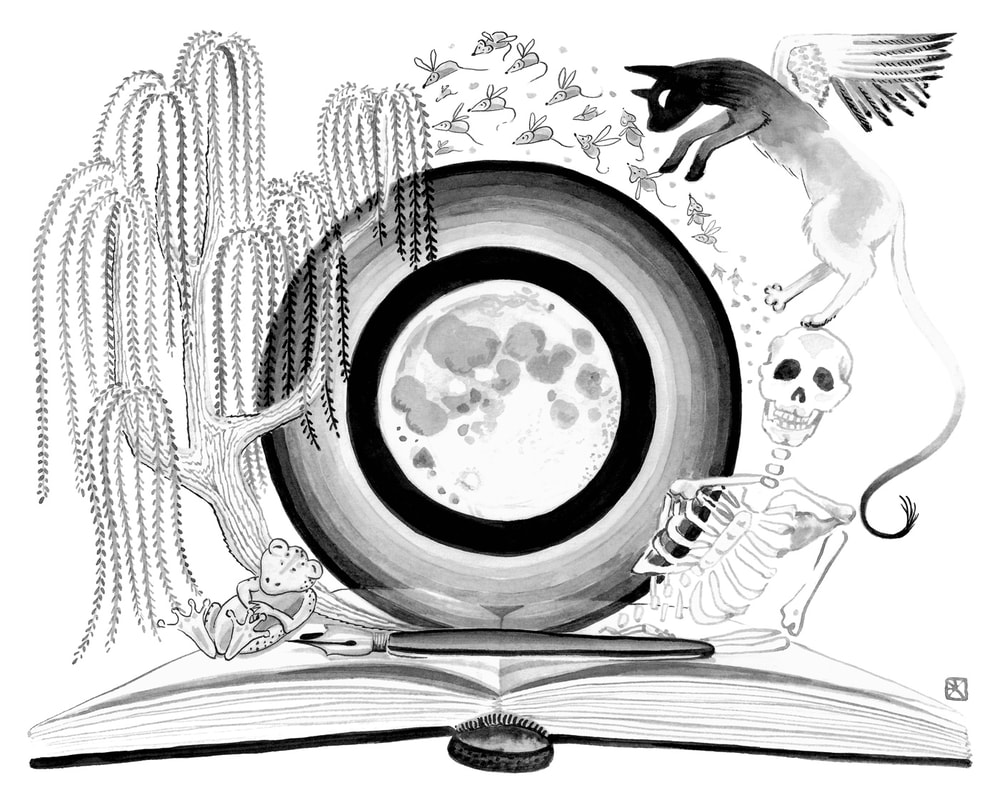

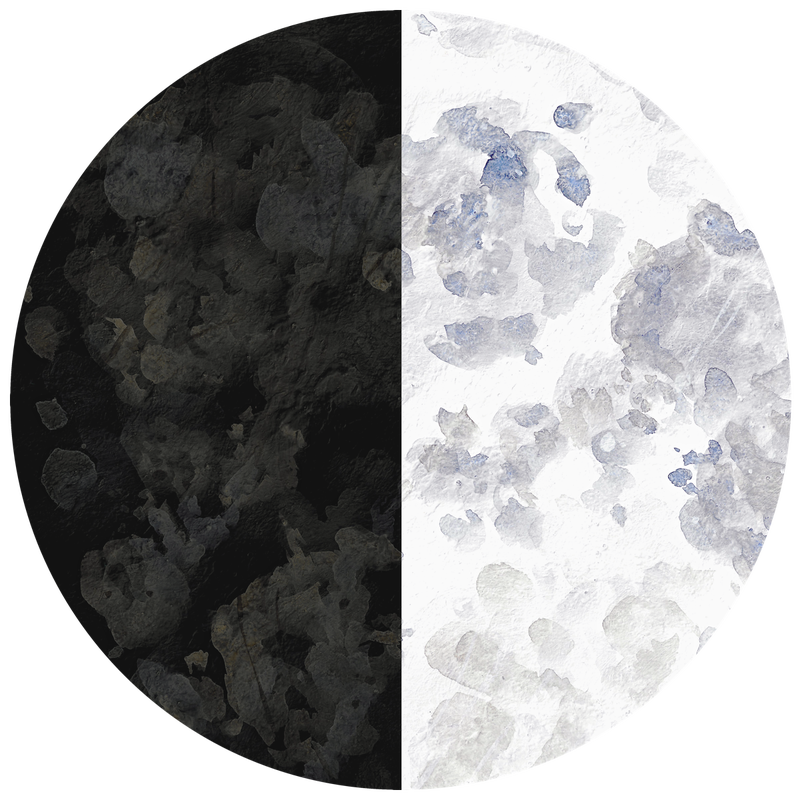
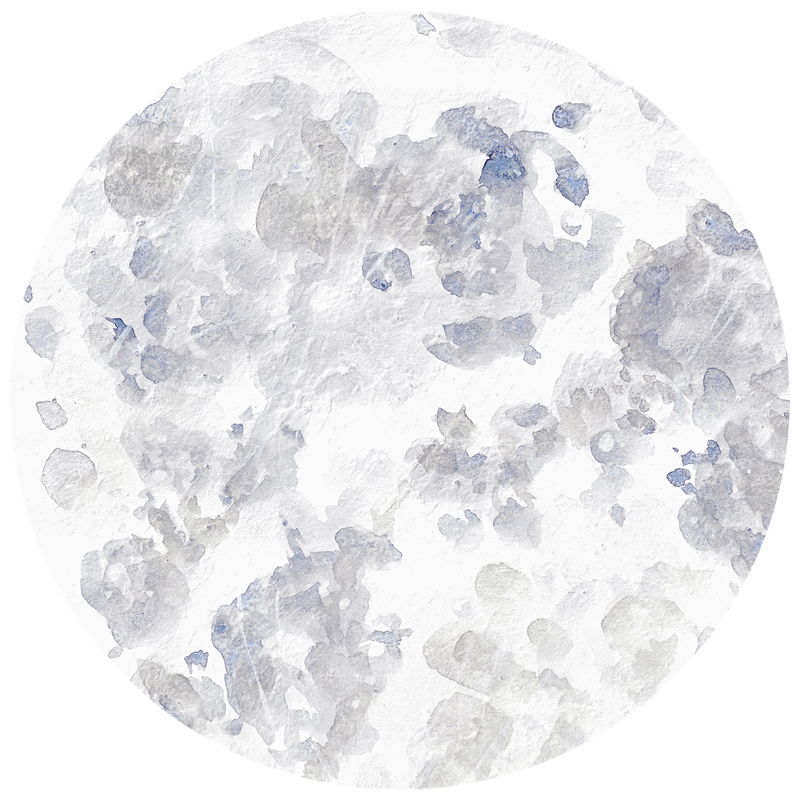
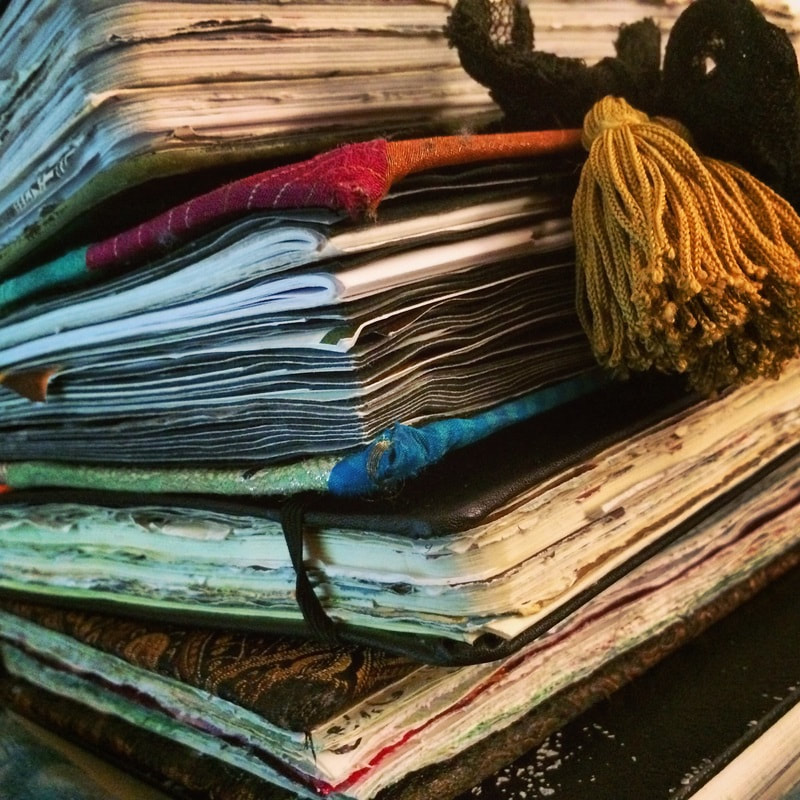
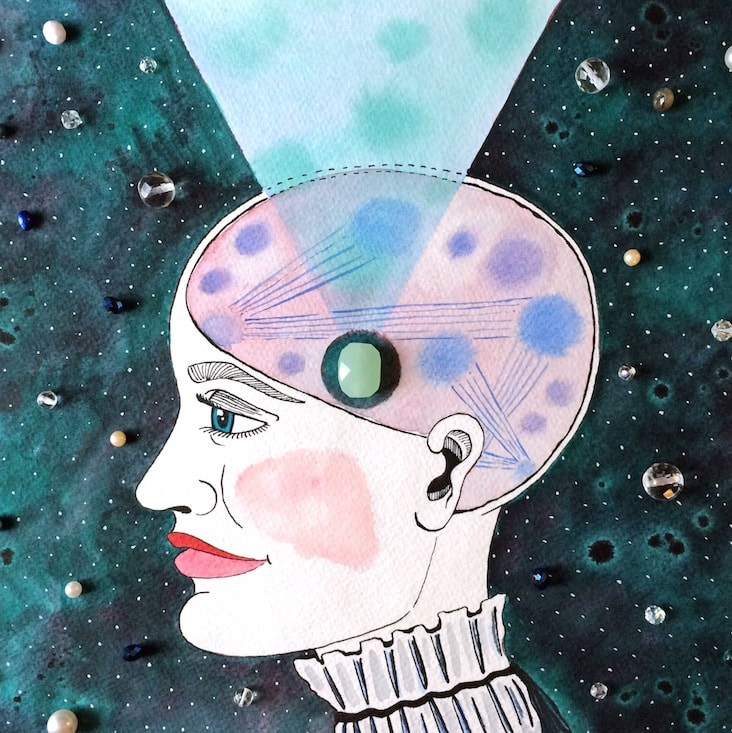
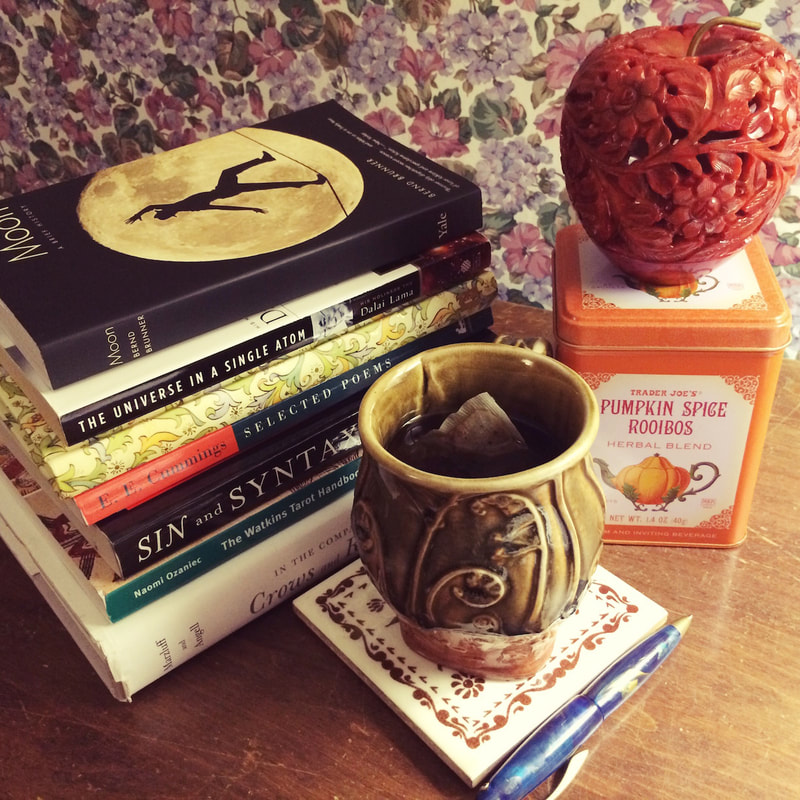

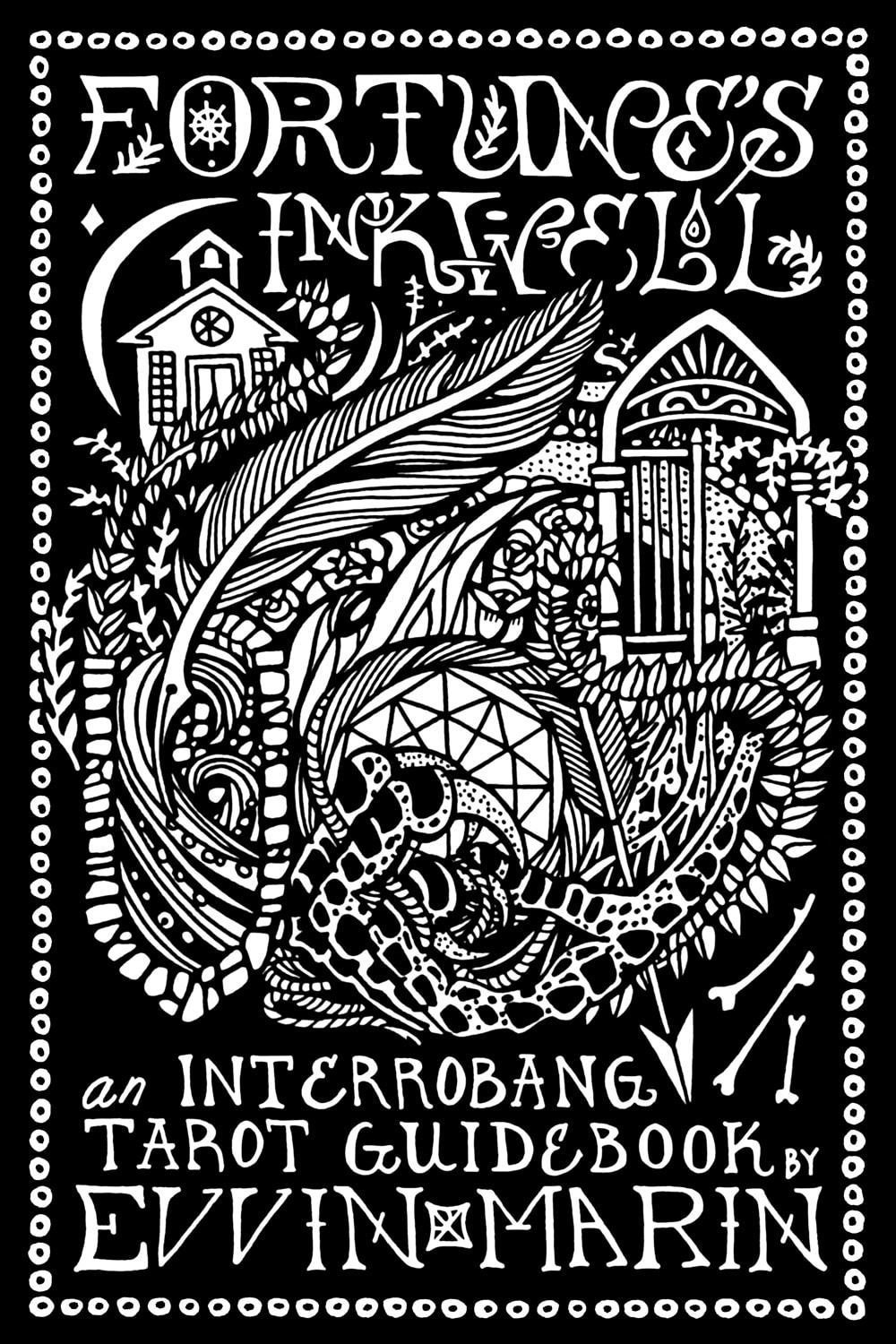
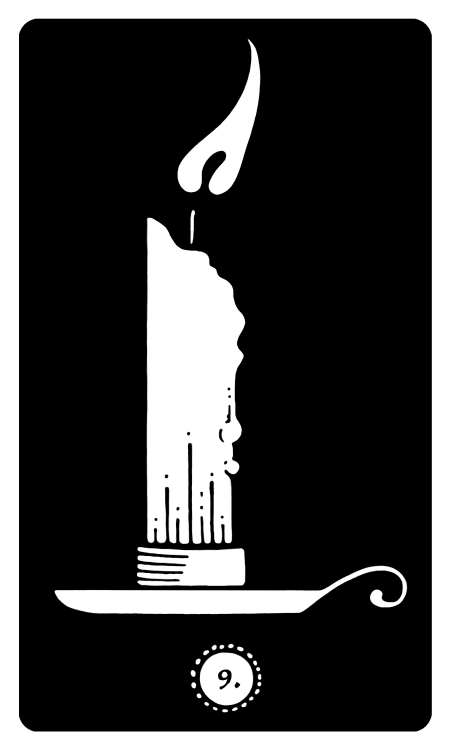
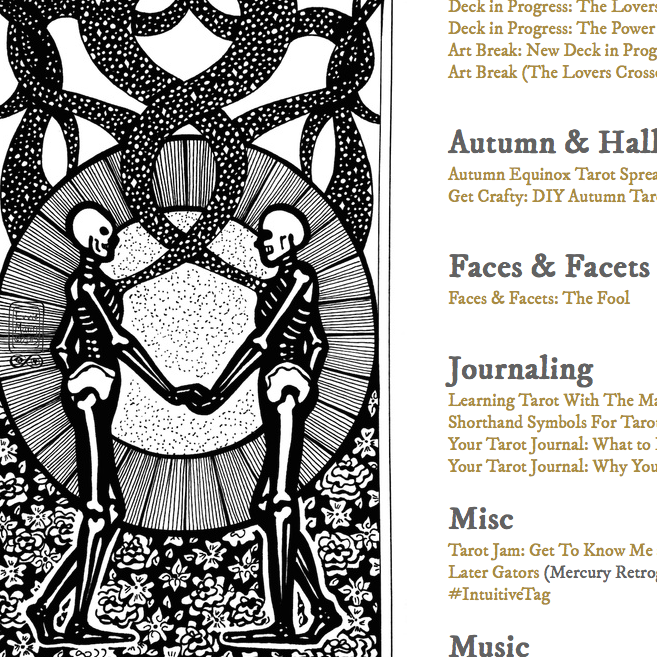

 RSS Feed
RSS Feed
